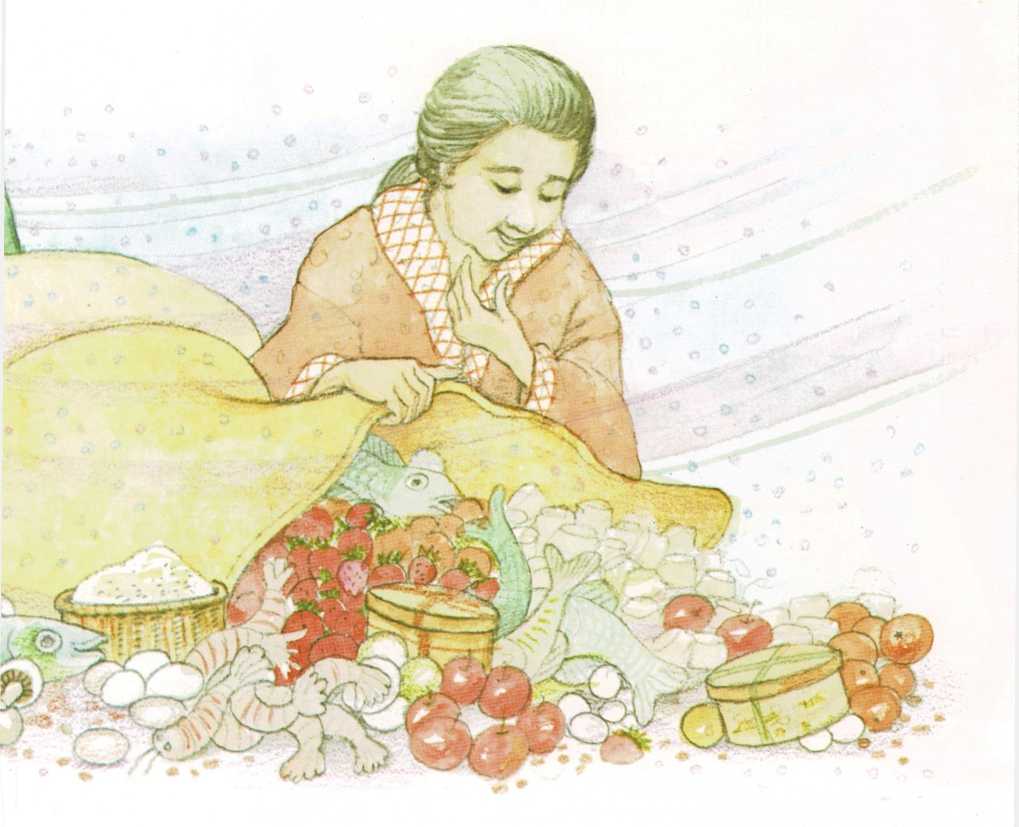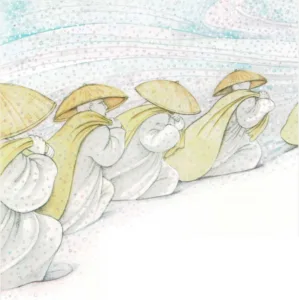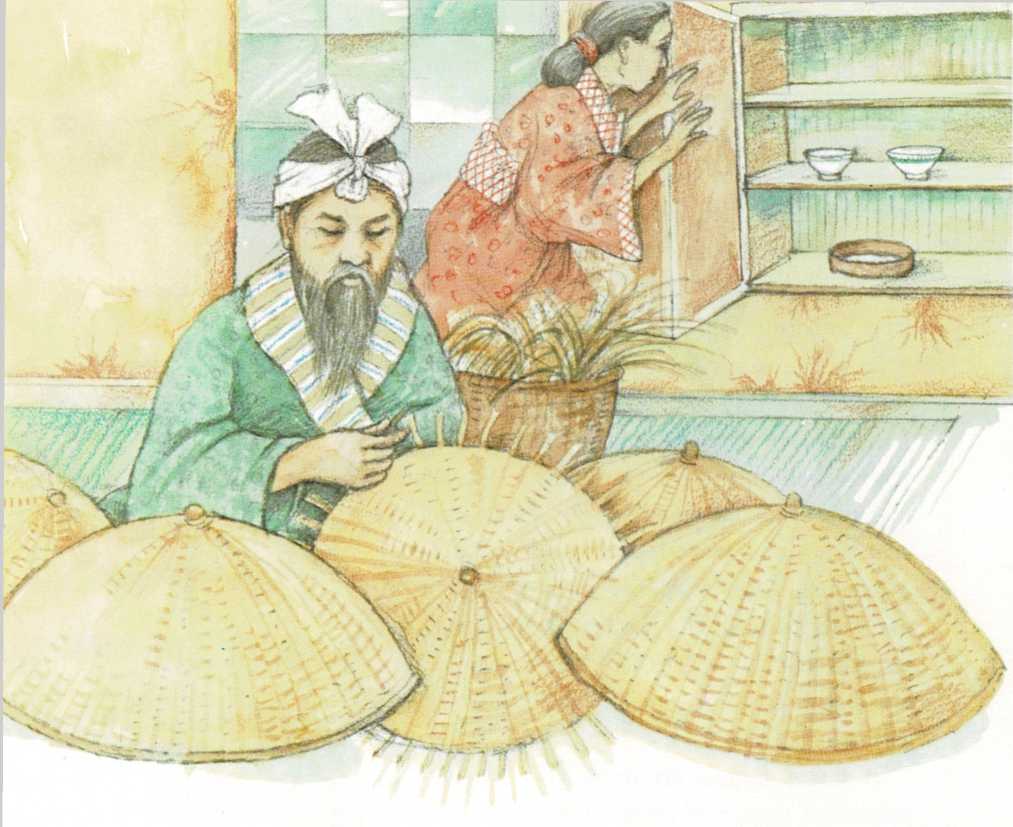
New Year’s Hats for the Statues
by Yoshiko Uchida
Once a very kind old man and woman lived in a small house high in the
hills of Japan. Although they were good people, they were very, very
poor, for the old man made his living by weaving the reed hats that
farmers used to ward off the sun and rain, and even in a year’s time, he
could not sell very many.
One cold winter day as the year was drawing to an end, the old woman
said to the old man, \”Good husband, it will soon be New Year’s Day, but
we have nothing in the house to eat. How will we welcome the new year
without even a pot of fresh rice?” A worried frown hovered over her
face, and she sighed sadly as she looked into her empty cupboards.
But the old man patted her shoulders and said, \”Now, now, don’t you
worry. I will make some reed hats and take them to the village to sell.
Then with the money I earn I will buy some fish and rice for our New
Year’s feast.”
On the day before New Year’s, the old man set out for the village with
five new reed hats that he had made. It was bitterly cold, and from
early morning, snow tumbled from the skies and blew in great drifts
about their small house. The old man shivered in the wind, but he
thought about the fresh warm rice and the fish turning crisp and brown
over the charcoal, and he knew he must earn some money to buy them. He
pulled his wool scarf tighter about his throat and plodded on slowly
over the snow-covered roads.
When he got to the village, he trudged up and down its narrow streets
calling, \”Reed hats for sale! Reed hats for sale!” But everyone was too
busy preparing for the new year to be bothered with reed hats. They
scurried by him, going instead to the shops where they could buy sea
bream and red beans and herring roe for their New Year’s

feasts. No one even bothered to look at the old man or his hats.
As the old man wandered about the village, the snow fell faster, and
before long the sky began to grow dark. The old man knew it was useless
to linger, and he sighed with longing as he passed the fish shop and saw
the rows of fresh fish.
\”If only I could bring home one small piece of fish for my wife,” he
thought glumly, but his pockets were even emptier than his stomach.
There was nothing to do but to go home again with his five unsold hats.
The old man headed wearily back toward his little house in the hills,
bending his head against the biting cold of the wind. As he walked
along, he came upon six stone statues of Jizo, the guardian god of
children. They stood by the roadside covered with snow that had piled in
small drifts on top of their heads and shoulders.
“Mah, mah, you are covered with snow,” the old man said to the
statues, and setting down his bundle, he stopped to brush the snow from
their heads. As he was about to go on, a fine idea occurred to him.
\”I am sorry these are only reed hats I could not sell,” he apologized,
\”but at least they will keep the snow off your heads.” And carefully he
tied one on each of the Jizo statues.
\”Now if I had one more there would be enough for each of them,” he
murmured as he looked at the row of statues. But the old man did not
hesitate for long. Quickly he took
the hat from his own head and tied it on the head of the sixth statue.
\”There,” he said looking pleased. \”Now all of you are covered.” Then,
bowing in farewell, he told the statues that he must be going. \”A happy
new year to each of you,” he called, and he hurried away content.
When he got home the old woman was waiting anxiously for him. \”Did you
sell your hats?” she asked. \”Were you able to buy some rice and fish?”
The old man shook his head. \”I couldn’t sell a single hat,” he
explained, \”but I did find a very good use for them.” And he told her
how he had put them on the Jizo statues that stood in the snow.
\”Ah, that was a very kind thing to do,” the old woman said. \”I would
have done exactly the same.” And she did not complain at all that the
old man had not brought home anything to eat. Instead she made some hot
tea and added a precious piece of charcoal to the brazier so the old man
could warm himself.
That night they went to bed early, for there was no more charcoal and
the house had grown cold. Outside the wind continued to blow the snow in
a white curtain that wrapped itself about the small house. The old man
and woman huddled beneath their thick quilts and tried to keep warm.
\”We are fortunate to have a roof over our heads on such a night,” the
old man said.
\”Indeed we are,” the old woman agreed, and before long they were both
fast asleep.
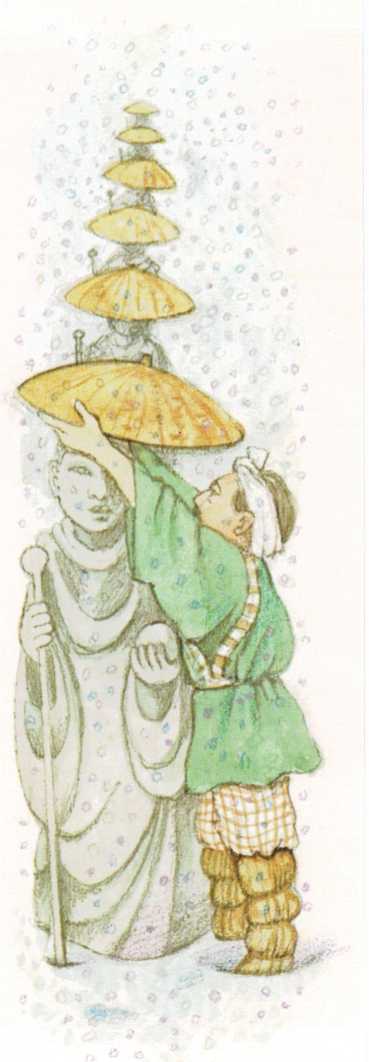
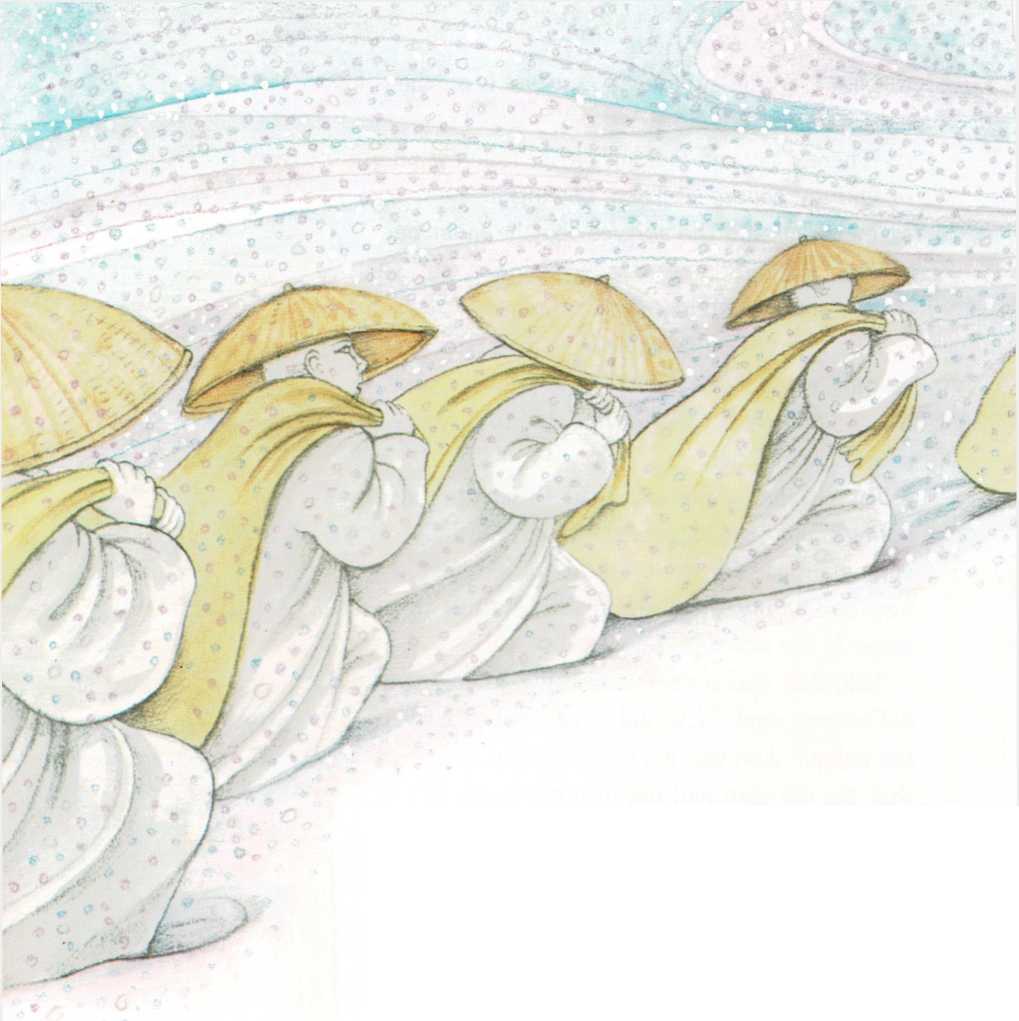
About daybreak, when the sky was still a misty gray, the old man
awakened for he heard voices outside.\”Listen,” he whispered to the old woman.
\”What is it? What is it?” the old woman
asked.
Together they held their breath and listened. It sounded like a group of
men pulling a very heavy load.
“Yoi-sah! Hoi-sah! Yoi-sah! Hoi-sah!” the voices called and seemed to
come closer and closer.
\”Who could it be so early in the morning?”
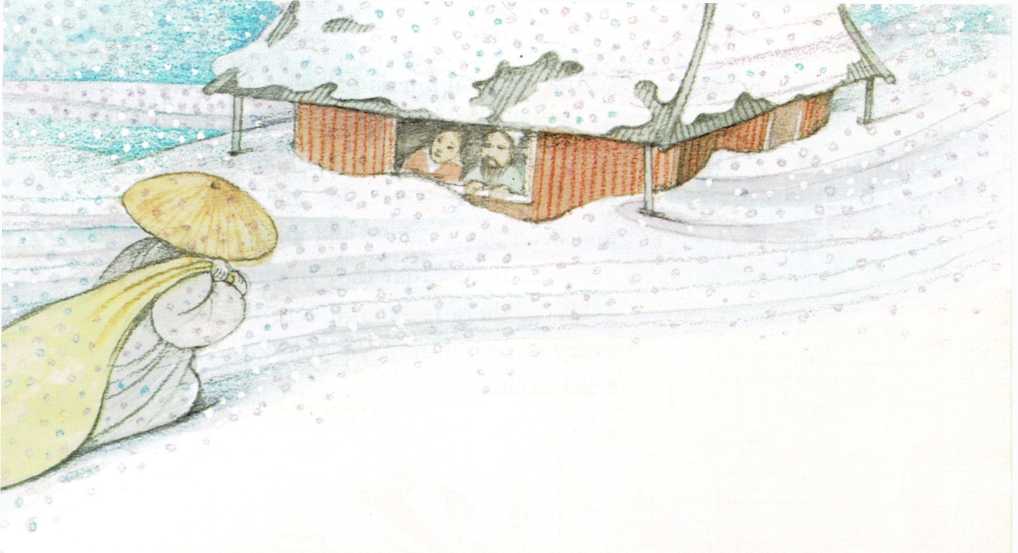
the old man wondered. Soon, they heard the men singing.
\”Where is the home of the kind old man, The man who covered our heads?
Where is the home of the kind old man, Who gave us hats for our heads?”
The old man and woman hurried to the window to look out, and there in
the snow they saw the six stone Jizo statues lumbering toward their
house. They still wore the reed hats the old man had given them and each
one was pulling a heavy sack.
“Yoi-sah! Hoi-sah! Yoi-sah! Hoi-sah!” they called as they drew nearer
and nearer.
\”They seem to be coming here!” the old man gasped in amazement. But the
old woman was too surprised even to speak.
As they watched, each of the Jizo statues came up to their house and
left his sack at the doorstep.
The old man hurried to open the door, and as he did, the six big sacks
came tumbling inside. In the sacks the old man and woman found rice and
wheat, fish and beans, wine and bean paste cakes, and all sorts of
delicious things that they might want to eat.
\”Why, there is enough here for a feast every day all during the year!”
the old man cried excitedly.
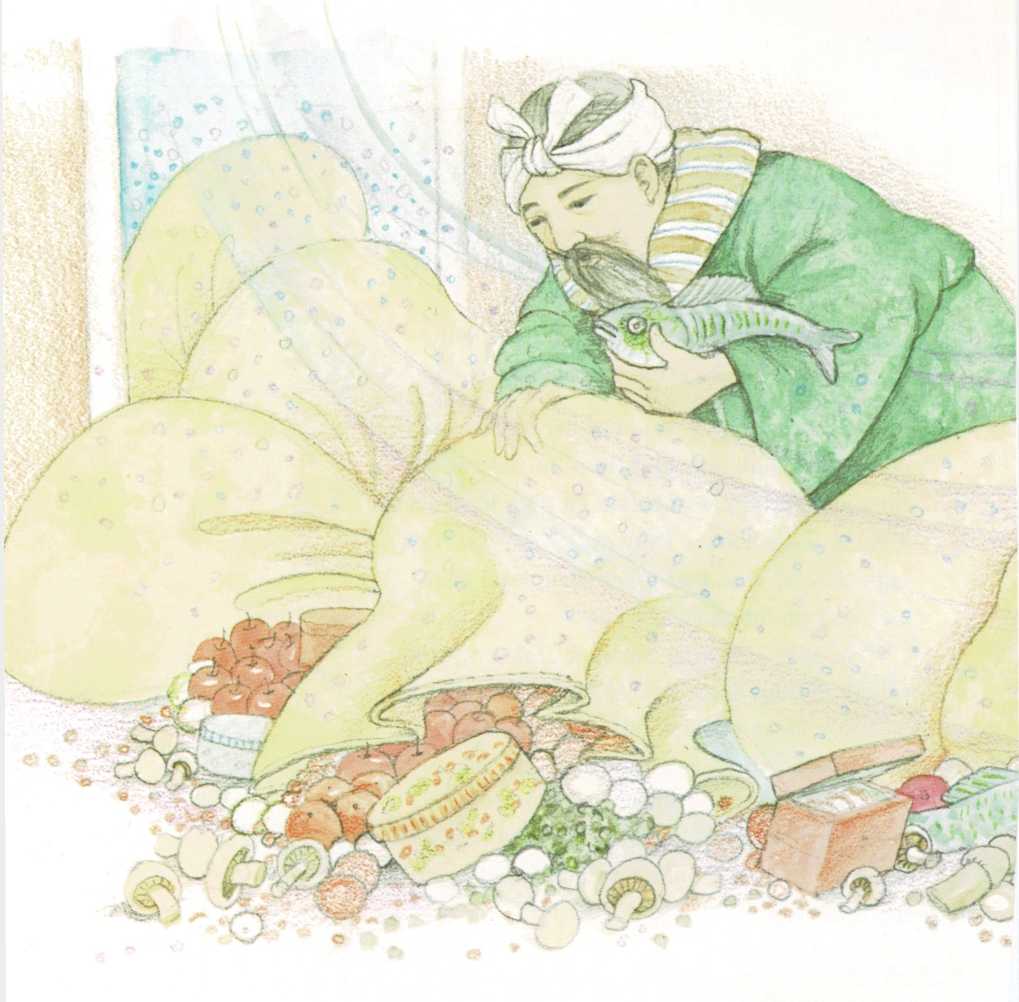
\”And we shall have the finest New Year’s feast we have ever had in our
lives,\” the old woman exclaimed.
\”Ojizo Sama, thank you!” the old man shouted.
\”Ojizo Sama, how can we thank you enough?” the old woman called out.
But the six stone statues were already moving slowly down the road, and
as the old man and woman watched, they disappeared into the whiteness of
the falling snow, leaving only their footprints to show that they had
been there at all.
